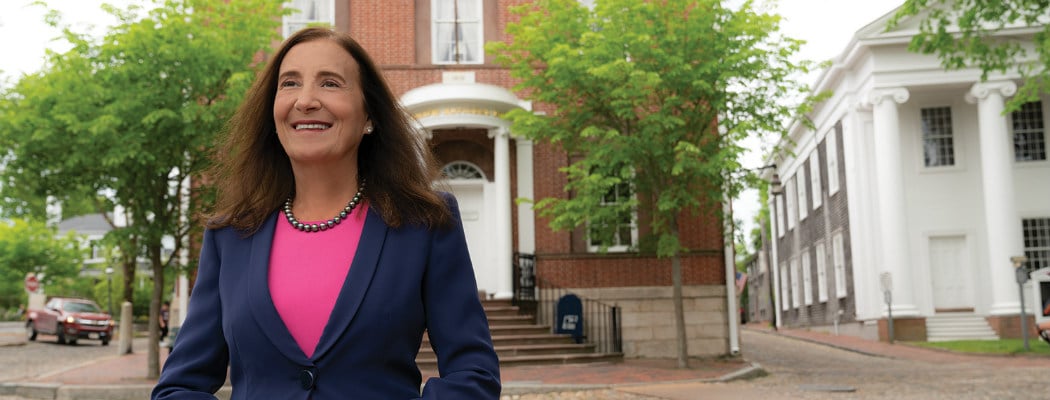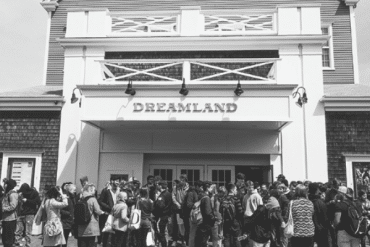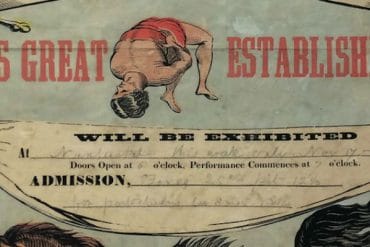A conversation with Massachusetts State Treasurer Deborah Goldberg.
Deborah Goldberg is the State Treasurer and Receiver General of Massachusetts, overseeing a wide-range of government agencies, ranging from the Alcoholic Beverages Control Commission to the Massachusetts School Building Authority to the Lottery, which is the only source of unrestricted local aid in the state. Goldberg was elected as a Democrat in 2014 and has gained a sterling reputation as a thoughtful steward of the Massachusetts Treasury who has advocated policies designed to support those at the lower end of the state’s economic ladder. Goldberg’s family founded Stop & Shop in 1914 and ran the company as a paternalistic, employee-centric organization until it was a victim of a hostile takeover in 1988.
 Goldberg’s family have been Cape Codders since the 1930s and were constantly making the trip over to Nantucket. She and her husband Michael Winter could not resist the island’s draw, leaving the Cape behind when they became residents shortly after their children were born. They consider Nantucket an important part of their lives. N Magazine sat down with the Treasurer who shared her views on a wide range of topics relating to her job and the island.
Goldberg’s family have been Cape Codders since the 1930s and were constantly making the trip over to Nantucket. She and her husband Michael Winter could not resist the island’s draw, leaving the Cape behind when they became residents shortly after their children were born. They consider Nantucket an important part of their lives. N Magazine sat down with the Treasurer who shared her views on a wide range of topics relating to her job and the island.
N MAGAZINE: How did you discover Nantucket or how did Nantucket discover you?
GOLDBERG: My grandmother started going to Nantucket in the early fifties and bought [lighthouse] baskets from Mr. Ramos. So when I was a little girl, I already had a connection to Nantucket because my grandparents who lived on the Cape were already going there and brought home multiple Nantucket baskets for everyone in the family. By the time I was seventeen, I started traveling over to Nantucket with friends and staying and bike riding around the whole island, and I fell in love with everything about Nantucket that we all value.
 N MAGAZINE: Given your family’s history as the founders of Stop & Shop, what are your thoughts about the recent strike, which obviously had a major impact on Nantucket?
N MAGAZINE: Given your family’s history as the founders of Stop & Shop, what are your thoughts about the recent strike, which obviously had a major impact on Nantucket?
GOLDBERG: From the very beginning, Stop & Shop meant not only jobs for our family, but for generations of families throughout Massachusetts. I was brought up to someday run Stop & Shop and sustain what we meant to the state, the economy and public life. But we went through a hostile take-over in 1988, and when my parents refused to fire their employees, we were all thrown out. Had that not occurred, I would be there today and a strong middle class would be sustained in Nantucket, in Martha’s Vineyard and in every single corner of Massachusetts, contributing to the economic vitality of our state. That is not what is occurring with the present owners of Stop & Shop. They have no understanding and no relationship to what the overall needs are of everyone here in Massachusetts and the critical role that Stop & Shop used to play and should continue to play in making sure that Massachusetts is a great place to live and is an economically secure state.
N MAGAZINE: We’re seeing consolidation of businesses where the working class is not able to make what is considered a living wage. What can be done to protect those workers? Or should the free market be left to its own devices?
GOLDBERG: The approach that I’ve taken in the Treasurer’s Office is a combination of nurturing and supporting businesses while also ensuring that everyone gets an opportunity to have good-paying jobs. If you look at our financial literacy programs, our seeded college savings accounts that help people avoid debt, our wage equality work—it’s not legislative; it’s not a stick that hits businesses. I come to it with a business person’s point of view. I know that we can institute programs that actually grow and create a situation where people have a living wage. So we blend good public policy with support of growing businesses, which is a very different approach than typically what you see government do. That is what I’d like to see taken nationally.
N MAGAZINE: The “millionaires tax” is being resurrected. How do we preserve the success of Massachusetts without the knee-jerk reaction that success among some people comes at the expense of others?
GOLDBERG: It’s a pretty complicated question if you’re looking for a simple answer. In Massachusetts, part of the challenge is because of Proposition 2 1⁄2 that was instituted in the 1970s. It negatively impacts local communities because even if their expenses continue to rise, they can only raise their taxes 2.5 percent plus new growth. Although our economy is doing well, when we saw greatly lowered gasoline prices two and a half years ago, we did not see increased spending in the state. The reason is people are in debt. There is still an enormously high debt load here in Massachusetts. That’s why I’ve provided a program that has reached over forty thousand high school students in three years, with experiential learning around what the cost of their lives will be. That is why I’m trying to teach people the financial skills they need to know in order to do well, and that includes the issues around debt.
 A millionaires tax emerges when people don’t understand the other elements that come into play that keep people from having real disposable incomes. It is back on the table because we aren’t getting the increased revenues that we need. And then on top of that, the tax bill that was instituted federally harmed Massachusetts. The millionaires tax is also a reaction to the federal tax bill. I think if you were to see any reversals in that trend, you’d see people pull back on this. Costs are going up in every area, and spending at the state level is trying to meet those needs. After all, education is one of the key success factors for Massachusetts, and one of the big pushes you’re seeing is the need to fund education at greater levels, particularly for communities that have typically been left behind. Worcester, Springfield, New Bedford and Lowell may be doing better, but better is not necessarily good.
A millionaires tax emerges when people don’t understand the other elements that come into play that keep people from having real disposable incomes. It is back on the table because we aren’t getting the increased revenues that we need. And then on top of that, the tax bill that was instituted federally harmed Massachusetts. The millionaires tax is also a reaction to the federal tax bill. I think if you were to see any reversals in that trend, you’d see people pull back on this. Costs are going up in every area, and spending at the state level is trying to meet those needs. After all, education is one of the key success factors for Massachusetts, and one of the big pushes you’re seeing is the need to fund education at greater levels, particularly for communities that have typically been left behind. Worcester, Springfield, New Bedford and Lowell may be doing better, but better is not necessarily good.
N MAGAZINE: We’re seeing a chorus of extremely wealthy people like Warren Buffett and Ray Dalio who are starting to suggest that capitalism is showing its flaws, specifically because the wealth gap is so large and that it is planting the seeds of discontent. Clearly, Nantucket in the summer is a study in contrast between extreme wealth and people who struggle on a daily basis. Where do you come out on this topic?
GOLDBERG: I’m right in line with Warren Buffett and Ray Dalio. I’ve been saying it for a very, very long time. I started talking about this in 1985 when I wrote a front-page newspaper piece at Harvard Business School called “There Is No Ethics Being Taught in Finance.” My theory was that capitalism is America’s version of socialism—and that that’s a good thing. We support entrepreneurs and businesses. And businesses grow, have lots of employees and provide good-paying jobs, relative job security and benefits. That is a good thing.
 What happened is that many companies today show no loyalty to young people, even young professionals. And consequently, young professionals are looking at where they can move in three to five years. The culture of being in a position where you spend your entire career is unheard of today. Entrepreneurs today are building companies and selling them, and so there is no sense of creating an equal society where there’s opportunity for everyone. Businesses are cyclical. There has to be room for understanding that too. You still want really good corporate governance, and at the same time you want to make sure that the shareholders and employees are well taken care of. It is a balancing act.
What happened is that many companies today show no loyalty to young people, even young professionals. And consequently, young professionals are looking at where they can move in three to five years. The culture of being in a position where you spend your entire career is unheard of today. Entrepreneurs today are building companies and selling them, and so there is no sense of creating an equal society where there’s opportunity for everyone. Businesses are cyclical. There has to be room for understanding that too. You still want really good corporate governance, and at the same time you want to make sure that the shareholders and employees are well taken care of. It is a balancing act.
I do think that if we could ever turn this around and build what really was the way in which America did so well for so long, it would be far better for our country than having these extremes we see today.
N MAGAZINE: What do you see as Nantucket’s biggest challenge going forward?
GOLDBERG: The biggest issue is sustaining its ecological balance as it continues to be developed. I think an enormous challenge for Nantucket is the affordability for year-rounders to live here as housing and land have become more and more expensive. That is the case in almost every single Massachusetts community. How do you preserve green space and ecology, and how do you create affordable housing? If you’re on the mainland, if you can’t afford to live in one town, you then move a little farther out to try a place to afford. But you don’t have that option in Nantucket. So people have got to work together and think strategically about how they envision life on Nantucket in ten years, twenty years, thirty years, and make some compromises on how to get that done.







